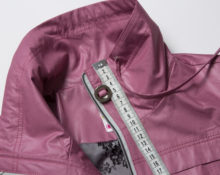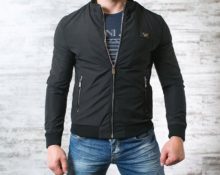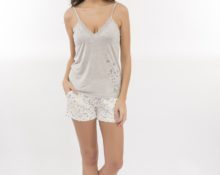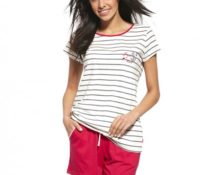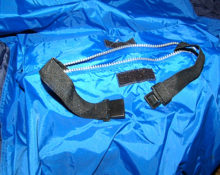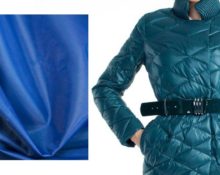 When it's drizzling or windy, but warm enough for a coat, most girls prefer to wear windbreakers. Even for older women, these are practical and comfortable clothes. Jeans, short or long skirts and dresses go perfectly with it.
When it's drizzling or windy, but warm enough for a coat, most girls prefer to wear windbreakers. Even for older women, these are practical and comfortable clothes. Jeans, short or long skirts and dresses go perfectly with it.
In stores it is not always possible to choose your size, height, favorite color or desired style, which is why it is so valuable to cut out and sew a women's windbreaker with your own hands. This item will become versatile and stylish in any wardrobe.
Stylish models and materials of women's windbreakers
 You can find a wide range of products in stores; we will focus only on popular models:
You can find a wide range of products in stores; we will focus only on popular models:
- Classic – light jacket with a fitted or straight silhouette with a zipper or buttons. More often these models are sewn from raincoat fabric.
- Shortened model Most often girls wear them under jeans or fluffy light skirts and miniskirts. These products are best made from eco-leather or denim.
- Leather jacket – a stylish youth jacket, a leader on world catwalks. The zipper in them is located diagonally. Looks great in business or sporty style.
- Quilted windbreaker – the warmest option among other products. Goes well with any things. Any materials are suitable: from knitwear to leather.
- Windbreakers made of lightweight fabrics Can be a decoration for an evening dress or maxi skirt. This is a great solution for cool summer evenings. A clutch bag can become a bright accent.
- Model parks new models for any age. The style of jackets has now switched to windbreakers. Fabrics need to be dense and without shine.
When you sew yourself, you can choose any model, or even create two fashionable items for the price of one.
Taking measurements
You can use an old sweatshirt, jacket, sweater or other clothing as a basis.. But in order for the windbreaker to fit perfectly, it is better to take measurements and draw a pattern. They are especially important if you want to sew an elongated fitted model.
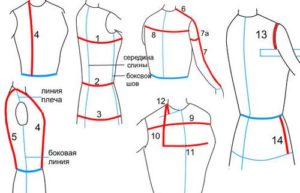 The measurements are always the same: waist, hips, circle breasts, needed shoulder width, and the length of the sleeve and necessarily the length of your product.
The measurements are always the same: waist, hips, circle breasts, needed shoulder width, and the length of the sleeve and necessarily the length of your product.
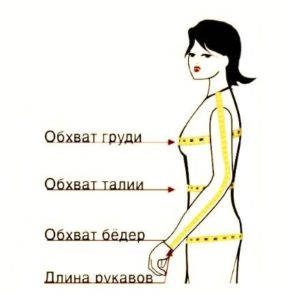 On windbreakers don't make tuckswhich are required for a dress or blouse (on the chest or waist). This is their main feature, which will facilitate the creation of patterns.
On windbreakers don't make tuckswhich are required for a dress or blouse (on the chest or waist). This is their main feature, which will facilitate the creation of patterns.
Attention! The length of the sleeve is measured from the top of the shoulder through the elbow (the arm should be half bent) and 5-6 cm below the wrist. Otherwise, the arm will be short in the finished product!
How to cut a women's windbreaker?
Let's take a step-by-step look at how to create a pattern in the simplest way. A novice craftswoman can easily handle it.
Cut out the shelves
First you should make a pattern of shelves on paper or newspaper, but Ideal templates are best made on graph paper.
Our drawing is a rectangle.
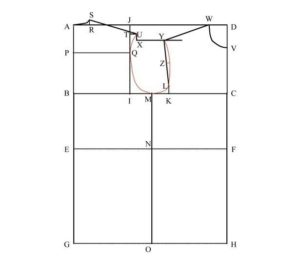 Short sides of the rectangle (A-D) should be equal to the half-circumference of the chest + 5-10 cm, so that the product fits the figure freely.But please note that a lot depends on the style of windbreaker you choose.
Short sides of the rectangle (A-D) should be equal to the half-circumference of the chest + 5-10 cm, so that the product fits the figure freely.But please note that a lot depends on the style of windbreaker you choose.
The long sides of the drawing (D-N) will accordingly be equal to the length of the future product.
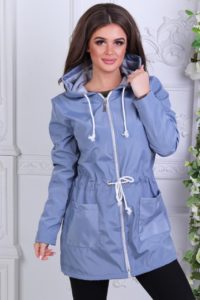 How to build windbreaker pattern for women?
How to build windbreaker pattern for women?
- We start from the top of the constructed drawing. So on distance 25-30 cm, and with a large size you need 35-40 cm, draw a straight line. This will be the chest line (B-C).
- Then the resulting straight line must be divided: i.e., the width of the back and the armhole area (this is the half-circumference of the chest, divided by 4 + 2 cm). It will work out front shelf products.
- We are building the neck. You need to step back about 6 cm from the corner, then deepen it in front by 5-6 cm. Then draw a neck along the back, just 1 cm above the rectangle, you need to step back 4-5 cm from the corner.
- Further from extreme points we carry out the lined neck shoulder seams. To do this, we underestimate them approximately by 1.5 cm (it is necessary to retreat from the top of the rectangle).
- Next we need to find middle of the armhole on the B-C straight line (chest line), to do this you need to lower the straight lines from the shoulders down. We make smooth semicircles to form an armhole.
- For a short windbreaker (above the hips), provided that the circumference of the hips is equal to the chest (hourglass type), the pattern is ready.
- If you have a “guitar” figure, i.e. the hips are wider than the chest volume, then you need to make a side cut flare (M-O) for the difference. Omit from mid-armhole points (M) aside for the difference.
 Thus, we received patterns for the shelves of the future windbreakers (front and back).
Thus, we received patterns for the shelves of the future windbreakers (front and back).
Important! When cutting on fabric, do not forget to add 2-3 cm allowances on all sides.
Sleeves
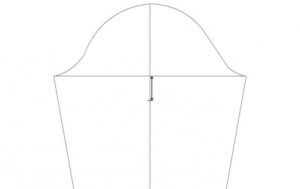 Let's move on to the sleeve of the product. Professional cutters use different methods for constructing sleeve patterns. The main principle is that the sleeve roll should be exactly fit into the armhole along the front and back.
Let's move on to the sleeve of the product. Professional cutters use different methods for constructing sleeve patterns. The main principle is that the sleeve roll should be exactly fit into the armhole along the front and back.
To do this, the finished drawings of the shelves need to be aligned along the shoulders, then move the line received armholes products separately onto paper. Then we round it on the pattern at the shoulder.
Then along the top you need to move up 1.5 cm and round it smoothly. To control, take a measurement so that it matches armhole length.
Hood pattern
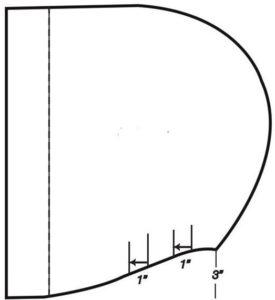 If you need a hood for your windbreaker, it’s easy to make.
If you need a hood for your windbreaker, it’s easy to make.
Need to try it on Head circumference: from center of forehead to back of head (you need to measure through the crown). Another measure is the length of the hood, it is measured from shoulder to crown heads.
The drawing is also constructed in an equilateral rectangle, where they should be equal height your his hood and, of course, 0.5 of the circumference of your head.
The right edge of the drawing needs to be rounded (the area of the crown). Lower the line from the forehead by 2 cm and draw 2 parallel lines.
At the neck, raise the line 3-4 cm inside the drawing, smoothly moving to the edge. This ensures a good fit of the future hood and no folds will form on the back of the head.
Collar
Cutting out a collar for a windbreaker is much easier.
To do this you will need a small strip of fabric, it should be equal to double height, as well as the width of the neck.
How to model a windbreaker style?
At the modeling stage, you should consider the shape and presence of pockets, zippers, stripes and other decor.
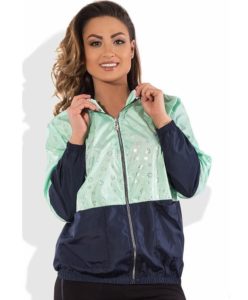
Pockets
Types of pockets, they can be:
- invoices of various shapes (“kangaroo”, round, square, simple);
- internal;
- with valves (in safari or casual styles);
- briefcase pocket (large in size, can be gathered and with flaps);
- pockets in the seam are open or with zippers (on the sides);
- welt pockets (with leaflet, flaps), etc.
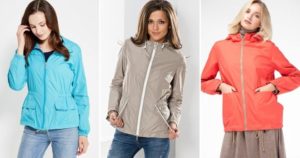
Cuffs
The sleeves can be made of ribbed fabric, you can turn the same fabric or insert a wide elastic band.
The models look interesting if you put a wide elastic band inside. Stretch it twice and stitch every 2 cm.
Cut out the linings
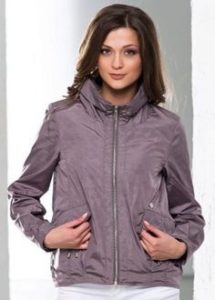 For summer, windbreakers without lining fabric are possible. For warmer models, you can use a silk lining or sew on a thin padding polyester layer.
For summer, windbreakers without lining fabric are possible. For warmer models, you can use a silk lining or sew on a thin padding polyester layer.
The pattern is the same; first, all the parts of the upper part of the windbreaker are sewn together.
Then the lining is assembled in exactly the same way, after which the 2 parts are joined together.
Important! Assembly order: start connecting both necks, then anterior incision. The sleeves are connected last.
For their aesthetics stitched through a small hole that is left only in 1 sleeve. Carefully sew up the 2nd sleeve.
The trim is cut out from main fabric and is duplicated for density with non-woven fabric.
Tips for Curvy Ladies
The described patterns will suit any size.
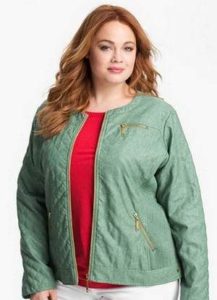 You can optionally flare it at the bottom, wear a belt on top, or make drawstrings on the sides and stretch any cord.
You can optionally flare it at the bottom, wear a belt on top, or make drawstrings on the sides and stretch any cord.
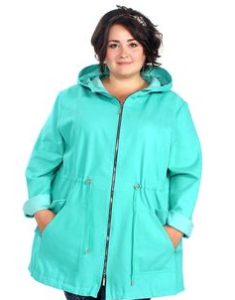 Another option for a windbreaker is gather at the sides or leave it free-form with internal (patch) low pockets.
Another option for a windbreaker is gather at the sides or leave it free-form with internal (patch) low pockets.
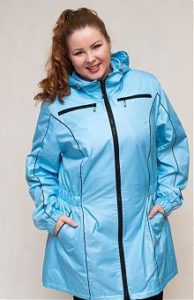 This will help you be fashionable and look slim.
This will help you be fashionable and look slim.
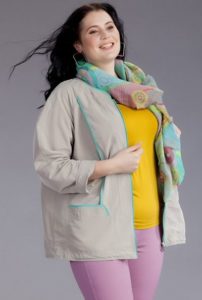 For curvy ladies, you need to choose an elongated model (below the hips); a belt does not always improve the silhouette.
For curvy ladies, you need to choose an elongated model (below the hips); a belt does not always improve the silhouette.  It is better to make the pockets internal so that they do not add additional volume.
It is better to make the pockets internal so that they do not add additional volume.
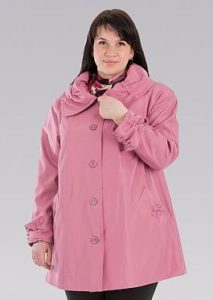
Advice! For a windbreaker, a hanger can be made from lining fabric or decorative cord. Secure the collar on the front side at the center between the lining and the back.
For beginners, it is better to practice on inexpensive fabric (calico, calico). But then you will boldly and efficiently create a miracle windbreaker, avoiding mistakes.


 0
0